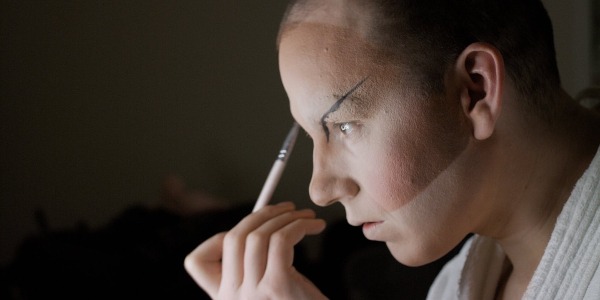TRIXIE MATTEL – MOVING PARTS: A Poignant Take On Ephemeral Fame

Rafaela Sales Ross is a proud Brazilian currently living in…
“This is gay world, though. You win a major award and you go back to your little dressing room”. Trixie Mattel – Moving Parts presents a stark contrast to the colourful, hyperbolic world of Ru Paul’s Drag Race. Here, bickering does not lead to strengthening fraternal-like bonds and heartfelt testimonies of a bleak past do not result in warm embraces and words of encouragement.
One of the most popular drag queens to come out of Ru Paul’s hit reality show, Trixie Mattel (Brian Firkus) is once again in front of the cameras, this time attempting to navigate a blurry post-Drag Race world. Moving Parts is a particularly poignant take into the consequences of having a subculture unexpectedly launched into global notoriety. As Brian gets himself in and out of pink, glittery dresses, tight corsets and custom made gigantic high heels, the audience is allowed an intimate glimpse into the performer’s trajectory and the way his turbulent family past and insecurities helped shape the flamboyant persona he now presents to the public.
A Rough Emotional Transaction
A lingering sense of solitude follows Trixie into crowded, loud spaces; filled with people who are quick to tell her how she changed their lives. Saved them. One after the other, fans pour their raw, unedited feelings into this plastic, manufactured figure, often forgetting what lies underneath the multiple layers of makeup. “People say ‘oh, they’re only people’. No, they’re not. They actually mean something to us”, says an enthusiastic young woman when discussing how much drag queens such as Trixie helped her cope with mental health issues such as anxiety and depression. The gain of this emotional transaction is uncomfortably unilateral.

The documentary shows how many Drag Race contestants are suddenly entrusted with a cumbersome psychological burden. Commonly struggling to overcome particular internal battles, they see themselves filling shoes far too complex to fill. Seating in front of her packed garage/storage room, Trixie rummages through dozens of fan mail; many detailing how close people were of self-harm before finding their way to her. The performer’s face conveys a heart-breaking lack of the emotional foundation required to deal with such a display of liability.
The distinction between creature and creator
The line between Trixie and Brian is one too unstable, and the character seems to rapidly become unable to offer its maker a sense of protection. Whilst many queens are categorical when separating their personas from who they are under it all, Moving Parts portrays Trixie as a blended figure, the overwhelming pile of professional responsibilities blurring the barrier between creature and creator. Trixie can no longer contain the downpour of worries during performances, and Brian struggles to live a life beyond the glittery pink, even going to lengths to avoid possible romantic partners knowing about his career. He craves a sense of normalcy and stability the world of drag simply cannot provide. As commitments become more regular, and time spent out of spandex more sparse, fewer details are left to differentiate the two.

Haunted by the awareness of ephemeral success, Trixie is constantly leaping into the next venture, with no time set aside for contemplation or self-care. The camera, however, provides a cathartic outlet to the artist, who ponders over her chaotic routine and its outcomes to the lens before strutting into yet another stage. Throughout the testimonials, director Nicholas Zeig-Owens offers the viewer an in-depth glance into Trixie’s melancholic countenance, one not even make up can fully obliterate. The mix of tiredness and frustration slowly overcomes the seemingly endless energy of the performer, who, by the time the credits roll, seems to want nothing more than a break from it all.
Conclusion
Trixie Mattel: Moving Parts is a raw, at times agonising portrait of the contemporary reality show celebrity and the consequential disconnection it creates between person and persona. There is much to be appreciated in seeing a former subculture rise to the mainstream, but the beauty of the wider picture often darkens the grimmer narrative developing behind the spotlight. In the realm of reality shows, where entertainment relies on openness and vulnerability, it’s vital to remember where television stops and real life begins.
What are your thoughts on the subject of post-reality show fame?
Trixie Mattel: Moving Parts is currently available on Netflix.
Does content like this matter to you?
Become a Member and support film journalism. Unlock access to all of Film Inquiry`s great articles. Join a community of like-minded readers who are passionate about cinema - get access to our private members Network, give back to independent filmmakers, and more.
Rafaela Sales Ross is a proud Brazilian currently living in Scotland. She has a Masters in Film and Visual Culture, and has been diving deep into the portrait of suicide on film for a few years now. Rafa, as she likes to be called, loves Harold and Maude, The Before Trilogy, The Broken Circle Breakdown, Kleber Mendonça Filho and pretty much anything with either Ruth Gordon or Javier Bardem in it. You can find her on both Twitter and Letterboxd @rafiews













